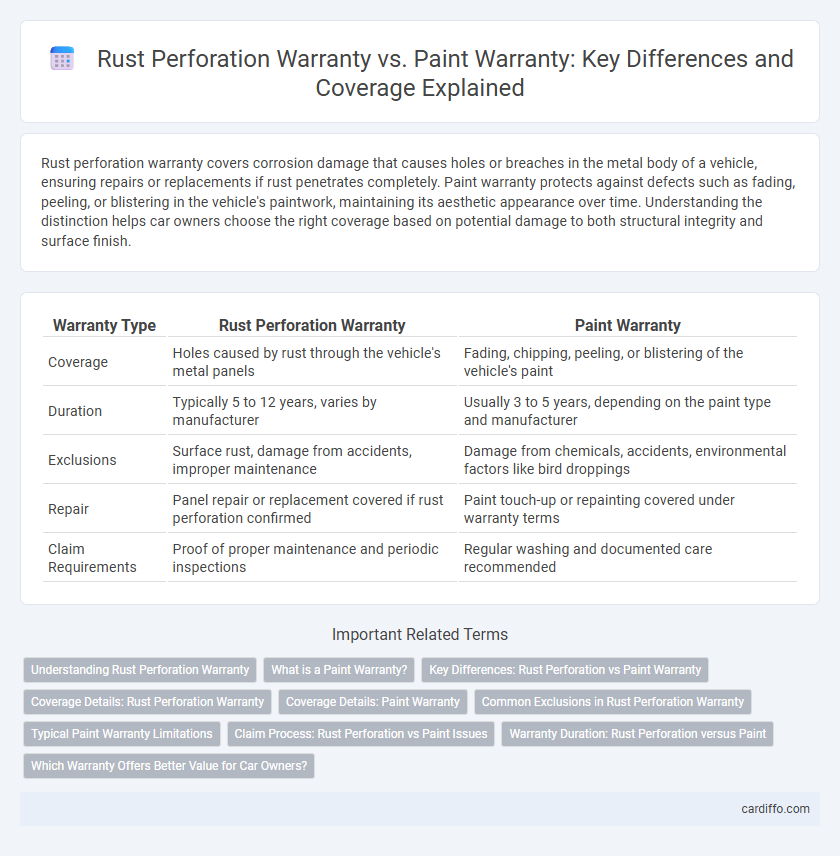Rust perforation warranty covers corrosion damage that causes holes or breaches in the metal body of a vehicle, ensuring repairs or replacements if rust penetrates completely. Paint warranty protects against defects such as fading, peeling, or blistering in the vehicle's paintwork, maintaining its aesthetic appearance over time. Understanding the distinction helps car owners choose the right coverage based on potential damage to both structural integrity and surface finish.
Table of Comparison
| Warranty Type | Rust Perforation Warranty | Paint Warranty |
|---|---|---|
| Coverage | Holes caused by rust through the vehicle's metal panels | Fading, chipping, peeling, or blistering of the vehicle's paint |
| Duration | Typically 5 to 12 years, varies by manufacturer | Usually 3 to 5 years, depending on the paint type and manufacturer |
| Exclusions | Surface rust, damage from accidents, improper maintenance | Damage from chemicals, accidents, environmental factors like bird droppings |
| Repair | Panel repair or replacement covered if rust perforation confirmed | Paint touch-up or repainting covered under warranty terms |
| Claim Requirements | Proof of proper maintenance and periodic inspections | Regular washing and documented care recommended |
Understanding Rust Perforation Warranty
Rust perforation warranty specifically covers rust that causes holes or perforations through the metal, ensuring protection against structural damage due to corrosion. Paint warranty, on the other hand, covers defects such as peeling, cracking, or fading of the vehicle's paint surface without addressing rust or corrosion issues. Understanding rust perforation warranty helps vehicle owners distinguish between coverage for actual metal damage and cosmetic paint problems, emphasizing the importance of corrosion protection.
What is a Paint Warranty?
A paint warranty guarantees coverage against defects in the vehicle's paint application, such as premature fading, peeling, or blistering, typically lasting between three to five years. This warranty ensures the vehicle's exterior maintains its aesthetic appearance, protecting against environmental damage like UV rays and chemical exposure. Unlike a rust perforation warranty that covers corrosion penetrating the metal body, a paint warranty focuses solely on the surface finish and color integrity.
Key Differences: Rust Perforation vs Paint Warranty
Rust perforation warranty covers the structural integrity of a vehicle by protecting against rust that creates holes or perforations through metal panels, typically lasting longer than paint warranties due to the severity of corrosion damage. Paint warranty focuses on the vehicle's exterior finish, safeguarding against defects such as fading, peeling, or blistering for a shorter period, often ranging from 1 to 5 years. Key differences include the scope of protection--rust perforation pertains to corrosion penetration through metal, while paint warranty addresses cosmetic surface issues--and the duration, with rust warranties usually spanning 6 to 12 years compared to the generally shorter paint warranty coverage.
Coverage Details: Rust Perforation Warranty
Rust perforation warranty specifically covers the internal corrosion that causes holes or perforations in the vehicle's metal body panels, typically lasting from 5 to 12 years depending on the manufacturer. This warranty excludes surface rust or cosmetic damage and is designed to protect against structural integrity issues caused by rust developing from the inside out. Coverage often includes repair or replacement of affected panels, provided that normal use and maintenance guidelines were followed.
Coverage Details: Paint Warranty
Paint warranty coverage typically includes protection against defects such as peeling, cracking, chipping, and fading caused by normal environmental exposure. It excludes damages resulting from accident, misuse, or improper maintenance, emphasizing durability under standard conditions. Coverage duration varies by manufacturer but often spans from 3 to 10 years, ensuring preservation of vehicle appearance over time.
Common Exclusions in Rust Perforation Warranty
Rust perforation warranty commonly excludes damage caused by environmental factors such as road salt, bird droppings, and industrial fallout, which accelerate corrosion beyond normal wear. Paint warranties typically do not cover rust-related issues, emphasizing surface finish defects like peeling, blistering, or fading due to UV exposure. Both warranties often exclude damage from accidents, improper maintenance, or modifications that compromise the vehicle's protective coatings.
Typical Paint Warranty Limitations
Typical paint warranty limitations often exclude coverage for rust perforation, as rust warranties specifically protect against corrosion that creates holes in the metal. Paint warranties generally cover defects like peeling, cracking, or blistering but do not address underlying metal damage caused by rust. Customers should understand that a separate rust perforation warranty is necessary for protection against metal corrosion beyond surface paint issues.
Claim Process: Rust Perforation vs Paint Issues
The rust perforation warranty claim process typically requires detailed inspection and documentation of metal corrosion that penetrates the vehicle's body, often involving professional assessment to verify structural damage. In contrast, paint warranty claims focus on surface defects like peeling, fading, or blistering, which are usually easier to document with photographs and customer reports. Both processes require adherence to specific timeframes and warranty terms, but rust claims often involve more extensive evaluation due to the potential safety implications.
Warranty Duration: Rust Perforation versus Paint
Rust perforation warranties typically offer coverage ranging from 5 to 12 years, reflecting the critical need to protect against structural damage caused by corrosion. Paint warranties generally provide shorter durations, often between 3 to 7 years, as paint degradation affects appearance more than vehicle integrity. Understanding these differences helps consumers prioritize long-term investment protection against rust over aesthetic concerns covered by paint warranties.
Which Warranty Offers Better Value for Car Owners?
Rust perforation warranty provides comprehensive protection against structural damage caused by corrosion, often spanning 5 to 12 years depending on the manufacturer's policy, making it crucial for long-term vehicle integrity. Paint warranties typically cover defects such as fading, peeling, or blistering for a shorter duration, usually 3 to 5 years, focusing on aesthetic maintenance rather than critical protection. For car owners seeking better value, rust perforation warranty offers a higher return on investment by safeguarding the vehicle's performance and resale value.
Rust perforation warranty vs Paint warranty Infographic

 cardiffo.com
cardiffo.com